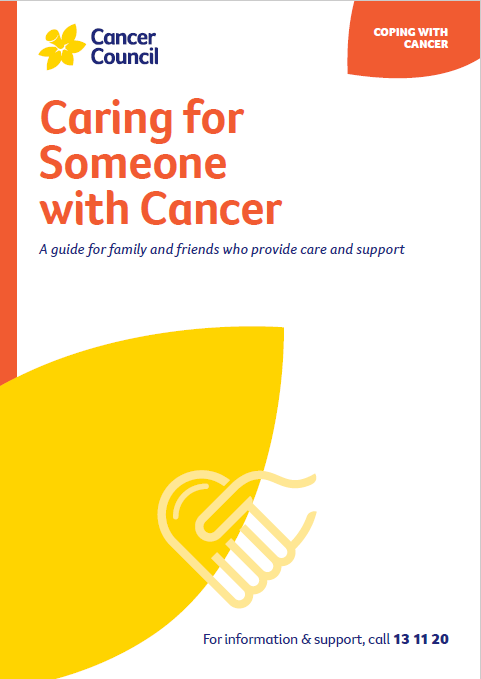- Home
- About Cancer
- Supporting someone with cancer
- Caring for someone with cancer
- Your role as a carer
Your role as a carer
You are a carer if you provide ongoing unpaid care and support to a person who needs help because of an illness, disability or ageing. Becoming a carer can happen without warning or develop over time.
Learn more about:
For your community
Types of caring situations
There are many different types of caring situations:
- you may be a partner, family member, child, friend or neighbour
- you might not see yourself as a carer, but as someone simply helping out a person in need
- you may feel that caring is part of your relationship with the person affected, or you may feel pressured to be a carer out of a sense of duty
- care may be needed for a few hours a week or on a 24-hour basis, and this may change over time
- you may provide care for a short time (days to weeks) or long term (months to years).
What carers do
Although every caring situation is different, the range of tasks involved can be grouped into 4 general areas. There may be other tasks involved depending on what the person you are caring for wants help with.
Below are some key tasks and skills that are often involved in caring.
 Medical care
Medical care
- attend medical appointments and treatment sessions
- advocate for the person with cancer
- help the person deal
- with symptoms, prescriptions and medicines
- look after paperwork on their behalf
 Practical support
Practical support
- provide transport to medical appointments
- prepare meals
- do shopping
- look after the home
- care for children, parents and pets
- help with personal care (showering, dressing and toileting)
- arrange for aids and mobility equipment
 Financial matters
Financial matters
- pay bills
- investigate sources of financial support
- arrange professional legal and financial advice
 Legal matters
Legal matters
- help the person plan for the future
- help organise legal documents
- talk about end-of-life plans and wishes
 Emotional support
Emotional support
- offer companionship and be a good listener
- provide encouragement, comfort and understanding
- arrange professional support if needed
- talk about things other than cancer
- keep family and friends updated
For more on this, see Cancer care and your rights and Cancer, work and you.
Carers in Australia
About 12% of Australians provide care to someone with a long-term illness, disability or ageing. This does not include people who are employed to look after someone.
Under Commonwealth legislation carers should have:
- the same rights as other Australians
- recognition and respect
- support to enjoy good health and social wellbeing
- economic security and the opportunity to do paid work and seek an education
- access to appropriate services
- acknowledgement as individuals with their own needs
- recognition as partners with other care providers.
All state and territory governments have also passed their own Acts and policies to recognise carers.
LGBTQI+
If you or someone you know is LGBTQI+, we have inclusive information about how cancer and its treatment can affect LGBTQI+ people.
→ READ MORE: Providing medical care
Video: Looking after yourself as a carer
Dr Alison White, Palliative Medicine Specialist, Royal Perth Hospital, WA; Tracey Bilson, Consumer; Louise Dillon, Consumer; Louise Durham, Nurse Practitioner, Palliative Care Outpatients, Princess Alexandra Hospital, QLD; Katrina Elias, Carers Program, South Western Sydney Local Health District, NSW Health, NSW; Jessica Elliott, Social Worker, Youth Cancer Services, Crown Princess Mary Cancer Centre, Westmead Hospital, NSW; Brendan Myhill, Social Worker and Bereavement Research Officer, Concord Repatriation General Hospital, NSW; Penny Neller, Project Coordinator, National Palliative Care Projects, Australian Centre for Health Law Research, Queensland University of Technology, QLD; Olivia Palac, Acting Assistant Director, Occupational Therapy, Gold Coast University Hospital, QLD; Nicole Rampton, Advanced Occupational Therapist, Cancer Services, Gold Coast University Hospital, QLD; Shirley Roberts, Nurse Consultant, Medical Oncology, Northern Adelaide Cancer Centre, SA; Dr Elysia Thornton-Benko, Specialist General Practitioner, and UNSW Research Fellow, NSW; Kathleen Wilkins, Consumer; Helen Zahra, Carers Program, South Western Sydney Local Health District, NSW Health, NSW
View the Cancer Council NSW editorial policy.
View all publications or call 13 11 20 for free printed copies.
